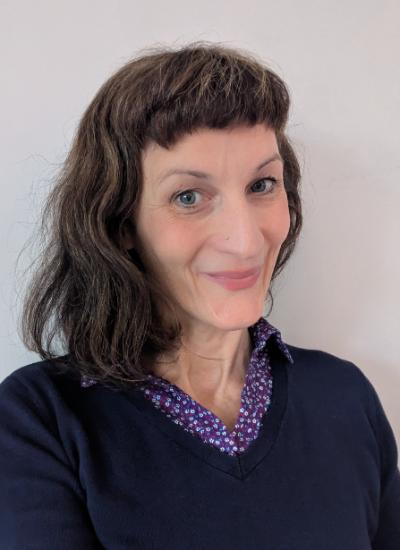Rebecca Smith
Lecturer in Rural Sustainability
e: rebecca.smith@uhi.ac.uk
t: 01851 770463
Rebecca’s first degree was a BSc (Honours) in Geography from Aberdeen University, followed soon after by a MSc in Sustainable Rural Development from Aberdeen University in 2004. She then worked for an environmental consultancy firm in the West Midlands as an Environment and Wastes researcher, working alongside local authorities to monitor, record, and provide guidance on the uptake of recycling schemes in the West Midlands. A particular focus at this stage of her career was working on an authority-wide project with the UK Charity WRAP (Waste and Resources Action Programme) to deliver and report on research into Barriers to Recycling at Home in 2008, which sparked an interest in Rebecca to better understand the relationship between people, the environment and consumerism. She since has transferred her interest and concern for these issues to the rural area she now lives and keeps a keen focus on better understanding the implications for rural areas adopting urban strategies for waste management.

In 2009 Rebecca moved to the Isle of Lewis (where she continues to live) and had her first child. Soon after that she started her job as a part-time lecturer in Sustainability for the University of the Highlands. With growing awareness of the economic, social and environmental costs involved with the transportation and eventual disposal of post-consumer waste, she started PHD research in 2012 into the question: Is there a Sustainable Future for Recycling in Remote and Rural Places?
This research wanted to explore whether recycling was the answer for more remote and rural parts of society. Could the promotion of a reuse culture bring more benefits to these regions where economies of scale are more problematic to justify investment in recycling technologies? How can and should a reuse culture be supported, and who should be responsible to ensure the structures are in place to support reuse?
With a second and third child following her first, Rebecca withdrew from her PHD research to focus on raising her children. However, her research interest only intensified during this time as she started to increasingly realise the heavy burden that consumerism can bring to family, home and community life, while managing the wants and wastes of growing family needs in an increasingly online and digitally exposed social world. It became clear to Rebecca that more needed to be done on a local level to encourage and support a shift towards less consumer orientated lifestyles. When the unique opportunity came to use the space of an old Edwardian shop in her village rent free, for the benefit of the ‘wider community’, she conducted some consultation in her local neighbourhood and set up the Roots for Low Impact Living CIC (SC688341).
The outcome of this was the establishment of the Old Shop Bayble Community Association, a neighbourhood shop on the Isle of Lewis that now opens weekly Tuesday to Saturday 12-5pm to promote the reuse of donated clothing, books, toys and Bric a’ Brac, as well selling locally made crafts and cakes. The shop is run entirely by a growing group of 11+ volunteers from the local community, each sharing regular 2.5-hour weekly shifts to run the shop. The shop promotes reuse locally providing a more resourceful way of living whilst also offering a significant node for social neighbourhood connectivity in a remote rural region. This experience of setting up a CIC and bringing people together to form a neighbourhood Community Association has proved valuable to Rebecca, helping her develop an even deeper and more critical understanding of her subject expertise through critical praxis.
Rebecca continues to explore how the facilitation of communities coming together to develop sharing networks can help support communities, families and neighbourhoods to live in a more sustainable and resourceful way. She sees this as a lifestyle choice that works well in rural areas, prioritizing well-being, social connection and resource sharing, as the antidote to the excesses of modern-day consumerism, materialism and waste. She hopes to see a stronger shift towards acknowledging the need for paid work in supporting a transition towards a reuse culture that can support a more resourceful and sustainable future for island communities.
Module Leadership
Rebecca is Module Leader for the Understanding Sustainability Discourses module on the MSc Sustainable Mountain Development and the Sustainability and Rural Regeneration Programmes (Level 11).
She is also Module Leader for several modules on the BA (Hons) Geography and Sustainable Development Programme, including:
- Introduction to Human Geography (Level 7)
- Exploring Economics in a Changing World (Level 7)
- Empowering Communities (Level 8)
- Approaches to Economic Development (Level 8)
- Consumerism and the Circular Economy (Level 10)
- Social Enterprise and the Social Economy (Level 10)
Dissertation Supervision
Rebecca can supervise undergraduate students, particularly those with a keen interest in sustainability, material circularity, and the practices of repair and reuse.
She has provided research supervision for the following undergraduate dissertation topics:
- Investigating the Impact of Urban Green Space Rehabilitation on Social Capital: Seven Lochs Wetland Park (2024)
- Sustainable and Empowered? An analysis of communities in Rural Scotland (2024)
- How people in Kilfinan Parish make sense of Community Empowerment: a study using Interpretative Phenomenological Analysis (2021)
- Perceptions towards sustainable food consumption and waste practices in the home - a survey of Scottish Highland Households (2018)
- Understanding people’s knowledge, perceptions and behaviours towards microplastics in the marine environment (2017)